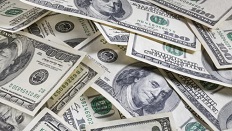Wall Street Journal: Uncle Sam Wants You: Treasury Depends More on Domestic Bond Buyers

Article by Daniel Kruger on Wall Street Journal
The U.S. government has been issuing more debt, but it’s not getting more foreign buyers in the door. As a result, U.S. investors have so far financed all of this year’s increase in the federal government’s borrowing.
Foreign holdings of the debt have remained essentially flat, though the government’s borrowing has risen by $500 billion, giving foreign investors the smallest share of U.S. government debt since 2003. Even as yields on Treasury securities have risen to multiyear highs, foreign demand for debt at government bond auctions has slowed to the weakest level since 2008. Yields rise when bond prices fall.
Some foreign investors are concerned that the $1.5 trillion tax cut passed by Congress in December will over-stimulate the U.S. economy, leading to an acceleration in inflation and potentially higher bond yields and interest rates.
While the tax cuts are stimulative, shifts in Federal Reserve policy and foreign purchases have led U.S. investors to purchase roughly $300 billion more Treasurys than would have been the case had Fed policy remained unchanged and foreign investors added to their holdings at their previous pace.
The drop in foreign demand is happening as Treasury yields approach their highest premiums over German and Japanese debt since the 1980s and as the dollar is in the middle of a rally that caught many investors by surprise. The drop-off in foreign interest also coincides with a decision by the Federal Reserve to reduce the size of its government bond holdings as part of an effort to restore monetary policy to precrisis norms.
Investors and analysts cite two impediments that are discouraging foreign investment. One is the strength of the dollar has made it more expensive for investors in Japan and Europe to hedge the currency risk of buying Treasurys. A second is a new concern about the sustainability of U.S. borrowing practices at a time when the Trump administration is forecast to run a series of trillion-dollar budget deficits beginning as soon as 2020.
The hedging costs are “so high and so punitive that it is no longer attractive” to buy Treasurys, said Torsten Slok, chief international economist at Deutsche Bank. The Fed is holding its target rate in a range between 1.75% and 2%, while rates for the Bank of Japan and the European Central Bank are negative.
A bigger concern perhaps is that by boosting debt to fuel growth at a time when the unemployment rate is about 4%, the U.S. may be “opening the door to much more serious risks,” Mr. Slok said.
Those risks for the economy, which grew at a 4.1% pace in the second quarter, include the possibility that it overheats. That could force the Fed to raise interest rates quickly, risking a rise in bond yields, and accelerate the next recession, Mr. Slok said.
To read this article in its entirety on Wall Street Journal website, click here